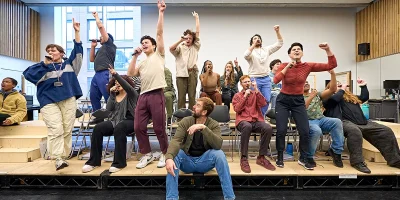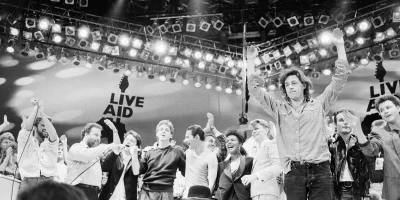
A guide to all the songs in 'Just for One Day'
The Live Aid jukebox musical is filled with bangers from Queen, David Bowie, Sting, and many more classic rock acts.
Forty years on, the Live Aid concerts masterminded by Bob Geldof remain a benchmark in the history of charitable fundraising. Horrified by reports of the contemporaneous famine in Ethiopia, which affected 7.75 million people, Geldof and many fellow musicians formed the supergroup Band Aid to release the charity single “Do They Know it’s Christmas?”, which led to the monumental Live Aid concerts. These events took place at London’s Wembley Stadium and Philadelphia’s John F Kennedy Stadium on 13 July 1985 and around 1.9 billion people worldwide in 150 countries watched the live broadcast.
Transferring to the West End from the Old Vic where it premiered last year (it also played for a limited run in Toronto), Just for One Day is a celebration of this groundbreaking event. The show features a book by John O’Farrell (Mrs Doubtfire) and is directed by Luke Sheppard (Starlight Express). In a 4-star review, LondonTheatre.co.uk’s reviewer relished the “high-octane blast of nostalgia pop… It's wall-to-wall with tunes that will make you want to dust of your denims”.
Read our guide to the songs from this uplifting and nostalgic show – how many of your favourite rock classics are included?
Book Just for One Day tickets on LondonTheatre.co.uk.

“Heroes”
In the present day, a group of individuals – Suzanne, Jim, Marsha, and Amara – who were involved in the Live Aid concert recall how inspirational the event was and how it made them feel as if they could change the world. David Bowie’s “Heroes” tells the story of two lovers, one from behind the Iron Curtain and the other from the west. The song wasn’t acknowledged as a classic until Bowie performed it at Live Aid and it is now deemed one of his greatest hits.
“Rat Trap”
Bob Geldof, the mastermind behind Live Aid, has a less rose-tinted view of the world-changing concert when he’s questioned by Jemma, a Gen-Z history student. “Rat Trap” was the third single from The Boomtown Rats’ second album A Tonic for the Troops and tells the story of a boy called Billy who feels trapped in his run-down hometown. At the Live Aid performance, Geldof’s microphone malfunctioned and only his bandmate Simon Crowe’s vocals could be heard. In the musical, Geldof performs the song in a mocking style.
“Drive”
American band The Cars’ song “Drive” was performed at the Philadelphia Live Aid event and was also used to accompany a photographic montage of images of the Ethiopian famine on CBS. The re-released single reached number 4 in the charts and raised nearly £160,000 for the Live Aid Trust. In the show, this number marks Geldof’s realisation that he has to do something to raise money for the victims of famine in Ethiopia.
“Dancing with Tears in My Eyes”
Geldof approaches Ultravox’s Midge Ure about the possibility of releasing a charity record to raise money for the famine victims. “Dancing with Tears in My Eyes” revived Ultravox’s career in 1984 and was the second song that the band performed at the Live Aid concert at Wembley.
“Everytime You Go Away” / “True” / “Every Breath You Take”
With the help of Marsha and Jim, Geldof and Ure create Band Aid, a group of musicians who will collaborate on the charity single. Paul Young’s cover version of “Everytime You Go Away” (by Daryl Hall) was performed at the Live Aid concert, as was Spandau Ballet’s “True”, and Sting’s and The Police’s signature song “Every Breath You Take”.
“Do They Know It’s Christmas?”
It’s the 1984 Christmas charity single that got the ball rolling. Written by Geldof and produced by Ure, vocalists on the single included Boy George, Bono, Phil Collins, George Michael, and many more. The single raised £8 million for famine relief within a year of its release. In the musical, Jemma has some questions about the lyrics (many of the famine victims were Christians who certainly would have been aware of Christmas…) but Geldof explains that it was written in a hurry.
“Radio Ga-Ga”
Queen’s 1984 single was a tribute to radio, which for some years had been superseded by television as the predominant mass media. It comments on music videos and MTV (established in 1981), which were competing with radio for the promotion of records.
“We Are the Champions”
Another Queen number, and one of their biggest hits. Indeed, one of Freddie Mercury’s greatest and most memorable performances took place at the Live Aid concert. In the show, record store staff Tim and Suzanne argue over where they think the profits from the charity single are going but ultimately reconcile.
“Stop Your Sobbing”
Prime Minister Margaret Thatcher refuses to waive VAT on sales of the charity record. She performs this song by The Kinks in retaliation.
“You’re the Best Thing”
Geldof meets Tim and Suzanne, who encourage him to visit Ethiopia to see first-hand how the money is being spent. The company performs this number by The Style Council.
“I’m Still Standing”
Geldof and Thatcher have a face off but Thatcher refuses to budge. Both are stubborn and determined individuals and they duet on this banger by Elton John.
“We are the World”
Inspired by “Do They Know It’s Christmas?”, musician and activist Harry Belafonte devises an American response written by Michael Jackson and Lionel Ritchie and produced by Quincy Jones. “We are the World” featured vocals from Bruce Springsteen, Tina Turner, Bob Dylan, and others, and became the eighth best-selling single of all time.
“Bad”
Geldof arrives in Ethiopia, where he meets welfare worker Amara, and is devastated by what he sees. The company performs U2’s “Bad”. When Bono performed the number at Live Aid, he leapt off to help a fan who was being crushed in the crowd.
“Message in a Bottle”
As Geldof learns more about Ethiopia, he becomes even more determined to raise funds that go directly to aid workers. To close Act One, the company sings the Police’s melancholic “Message in a Bottle”.
“Pinball Wizard”
Suzanne tells Jemma about Harvey Goldsmith, Britain’s biggest concert producer of the era. Geldof and Goldsmith don’t see eye to eye but agree to work together. The Who’s song “Pinball Wizard” has been played at nearly all of their concerts since 1969.
“Dancing in the Streets”
The press remains sceptical about Geldof’s motivations and tensions are running high, but there’s good news – Paul McCartney agrees to join the team. Mick Jagger and David Bowie recorded a cover of Motown favourite “Dancing in the Streets” for Live Aid.
“Summer of ‘69”
Suzanne is bitterly disappointed that Live Aid tickets have sold out, but Tim surprises her with his purchase. “Summer of ‘69” is a Bryan Adams number that explores the choice between pursuing a career as a rock star or settling down.
“Blowin’ in the Wind”
Amara observes the whirl of activity in the preparations and publicity of the Live Aid concert. “Blowin’ in the Wind” is a protest song by Bob Dylan, asking questions about war, peace, and freedom.
“Reach Out and Touch”
Thatcher arranges a meeting with Geldof to try to explain her point of view. Diana Ross’s debut solo single “Reach Out and Touch” was performed by Ashford & Simpson with Teddy Pendergrass at the Philadelphia Live Aid show.
“In the Air Tonight” / Why Can’t We Live Together”
Geldof is wracked with anxiety the night before the concert. “In the Air Tonight” was Phil Collins’s debut solo single and “Why Can’t We Live Together” was a response to the Vietnam War by one-hit wonder Timmy Thomas.
“We Will Rock You” / “King of Rock”
Live Aid kicks off with Queen classic “We Will Rock You” and "King of Rock", the title track of Run-DMC’s second album – the hip hop style is a contrast to the rock numbers that have come before in the show.
“Vienna”
Ure performs “Vienna”, his band Ultravox’s most successful single – he is, however, concerned about the concert’s running time.
“I Don’t Like Mondays”
Geldof takes to the stage with “I Don’t Like Mondays”, which was influenced by the Cleveland Elementary School shootings in San Diego in 1979. When the shooter was asked why she committed the crime, she responded “I don’t like Mondays”. In later years, Geldof has said that he regrets writing the song due to the way in which it boosted the killer’s profile.
“All You Need is Love”
Marsha and Jim have sex to the Beatles’ favourite, performed on this occasion in a rather confrontational style by Elvis Costello (Geldof commented that he wanted “Do They Know It’s Christmas?” to be as instantly recognisable as “All You Need is Love”).
“Against All Odds”
Suzanne and Tim finally share a kiss to Phil Collins’s power ballad “Against All Odds”, originally written for the 1984 film of the same name.
“Rebel Rebel” / “Don’t You (Forget About Me)” / “Into the Groove”
The concert is a phenomenal success and large amounts of money are flowing in. David Bowie performs a saxophone-heavy version of “Rebel Rebel”; in Philadelphia, Simple Minds perform The Breakfast Club anthem “Don’t You (Forget About Me)”, and Madonna sings “Into the Groove” from Desperately Seeking Susan.
“Bohemian Rhapsody”
What better way to celebrate than with Queen’s iconic "Bohemian Rhapsody"?
“My Generation”
Geldof and Suzanne encourage Jemma to keep fighting for what she believes in. The Who’s signature song “My Generation” is a counter cultural anthem about being young and trying to find your place in society.
“Let It Be”
Geldof is heartened by the way in which the younger generations are continuing the legacy of Live Aid. The finale comprises the Beatles’ uplifting “Let It Be”.
Book Just for One Day tickets on LondonTheatre.co.uk.
Photo credit: Just for One Day. (Courtesy of production)
Originally published on


